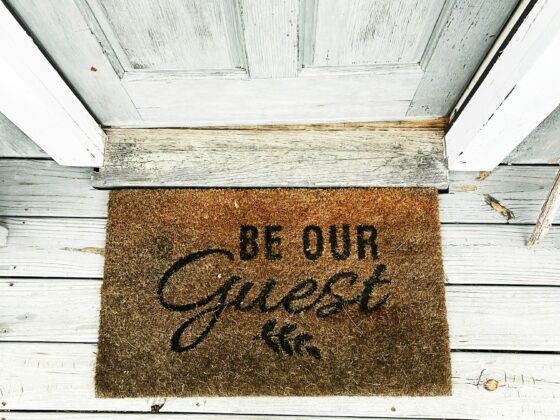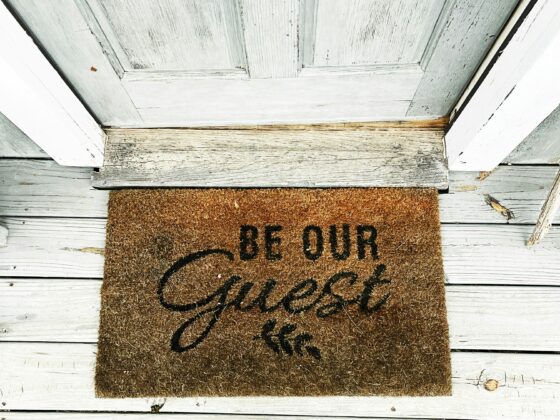Andrew: The network effect is real in hospitality, and a network doesn’t happen by accident. You’ve got to be very intentional with your actions to build these relationships, to build a strong foundation. And I have been incredibly fortunate in my career to work at some amazing companies with some incredibly talented people. And as we all know in hospitality, people move around, right? So these incredibly talented people have gone on to great success across the industry. And what is most powerful for me, and this is something I realized when I joined Actabl, is how all of these people in your network remember when you were at stake for them, when you went out of your way to help them.
And this could be a very simple example of how I helped an operations leader out of a jam with an owner years ago, right? And Brene Brown uses the marble jar analogy when she talks about building trust. And these moments matter, right? Helping that operations leader solve a problem with an owner, that’s putting the marble in the jar and that’s building trust.
And when I joined Actabl, one of my big realizations was the marbles have a very long shelf life. And so in my role at Actabl, these relationships and the trust that I built with some of my colleagues who are now our customers have proved to be very valuable and they help me unlock candid conversations and get to a level of understanding that I might not otherwise get to in a traditional technology supplier and customer relationship.
And Josiah, this gives me really an incredible behind the scenes understanding of what’s happening in our industry beyond the press releases and podcasts, right? And if you follow football, this is the Adam Schefter, the NFL Insider model applied to hospitality.
Josiah: It’s so great. And the first time we recorded, Andrew, what struck me is how you think about relationship building in every level of the organization. When you were a C-suite leader at some of the biggest management companies, you spent time on property, but also with people on the front lines of hospitality. I think the phrase you used was the cash registers don’t ring in the corporate office. And so you’re building those relationships. But it feels like at every level you’re understanding, you’re building empathy. I love the Brene Brown analogy. I’ll link in the show notes where people can watch a video clip if they’re unfamiliar with her analogy there. But just thinking about these interactions that we have, I’m very curious on a practical level, with all that you have going on, how do you think about allocating time to check in with these people that you have built and are building relationships with? I imagine that is tough because you could spend every minute of every day just focusing on the core part of your role leading at Actabl. But I see you time and again carving out time to build relationships. How do you do that?
Andrew: Well, I have to anchor myself in what’s most important for our business, and that is the voice of the customer. I know that the voice of the customer can get distilled as it travels through the organization, and things can get lost in translation. It’s nobody’s fault. That’s just the nature of communications. And so how do I get closer to the source, both internally with my team, those that are talking to the customers, and with the customers? Some of it is go to a corporate office of one of our customers, and oftentimes in those corporate offices there’s people who I’ve worked with in the past in some capacity, and I might just check in with them as I’m walking down the hallway. Hey, how are things going? What’s the latest? How can I be helpful? You find that this is unlocking some very meaningful conversations and understanding that you may not have had before because things were getting lost in translation. So it’s really about trying to get to genuine conversation with folks, and especially those in the field who have guests in front of them and are using the technology and have feedback, right? And some of that feedback can be very valuable as we think about our roadmap and how we can better enable the users of our products to get the business outcomes they’re looking for.
Josiah: I love that. I want to spend a moment talking about what you’ve observed around network effects in hospitality. This may be especially interesting for our listeners who are newer in their career. We were talking privately around some of the dynamics you’ve observed unfold, whether it’s at Aimbridge or other places that you’ve worked. You kind of see that careers are long. They typically involve different stops at different companies. And I wonder if you could speak a little bit more about what you’ve observed there, because it’s so interesting. I think if we think about Aimbridge, for example, it feels like a catalyst for talent in many ways. The relationships that you built there and now, you know, some of those people are leading at other companies. It’s really interesting to me to observe that.
Andrew: Well, you’re right. I mean, Aimbridge can be viewed as kind of the PayPal mafia effect in hospitality, right? Where many leaders have gone on to be very successful in senior level roles, CEO roles, C-level roles in other organizations. And that applies across all levels, right? A director might leave Abridge and end up as a vice president somewhere else. And so there’s tremendous opportunity in our industry and many people have talked about it. Geoffrey Ballotti is one who started a job at the front lines, right? And now he is the CEO of Wyndham, a publicly traded company. And we have this tremendous opportunity in hospitality to rise up through the ranks. And this is a business that has a lot of people who call it their home, right? They aspire to be in hospitality forever, and that works to our benefit when you think about the relationships you develop at a very young age or early in your career in hospitality, and you go on to leverage those relationships in ways you never thought were imaginable. Maybe you run into a GM that you worked with and that GM is now an RVP or has elevated into an above property role and is looking to hire someone. And so you can never underestimate the value of making these connections and maintaining them. That’s the important part. And it can’t be all about receiving, right? You have to give, you have to extend the olive branch, you have to pay it forward, and that will come back to you. So that’s something I practice regularly, is making sure that I am carving out the time to curate my network, to reach out to people to offer my assistance, and not from a self-serving standpoint, not even from an Actabl serving standpoint, but just in the interest of helping someone else solve a problem or be successful in our industry.
Josiah: It’s been really remarkable for me, Andrew, to watch you in action privately, sort of behind the scenes at some events where I recall a little while back we were with some leaders. One of them was looking to make a key hire, and you were spending so much time in that interaction thinking, okay, who might be some people who could be candidates that are effective here? And I think that’s just one example of thinking about who’s in my network, who do I know or who do I know who might know someone that could help you? And I think talent is one piece of the puzzle, but I see you constantly oriented around how do I help people in a material way versus, you know, just something that’s kind of trite. It’s real investments in people’s careers, but also their companies, their success. And it takes time. It takes time to do that.
Andrew: Well, you’re absolutely right. And I will, truth be told, this is not how I’ve always been wired, right? There was a self-serving aspect of me early in my career of what’s in it for me, how can I get to the next level? And there’s the elevator analogy. You take the elevator up, you just have to send it back down. And so that’s the career stage I’m at where I’ve matured. And I’ve had tremendous mentors along the way who’ve modeled the behavior that I aspire to deliver on. And that is helping people when there’s absolutely nothing in it for you. And that’s a true measurement of how far you’re willing to go. How far are you willing to extend yourself to help someone? And in that example, Josiah, it’s two birds with one stone. Helping the individual and a leader who’s looking to fill a position, and you’re helping the individual who may be in your network who’s looking for upward mobility or who’s looking to make a career change.





